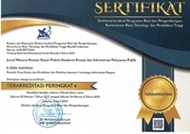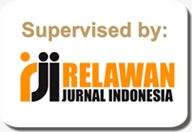Implementasi Manajemen Pengetahuan pada Perguruan Tinggi Swasta di Kabupaten Garut
Abstract
This study scrutinize the factors affecting knowledge management, consisting of acquisition of knowledge, storage of knowledge, distribution of knowledge and use of knowledge, at Private Higher Education Institutions in Garut Regency. The purpose of this study is to analyze the factors shaping the knowledge management. By using a survey method with a quantitative approach, the unit of analysis of this study is lecturer at 14 Private Universities in Garut Regency, with 229 lecturers as respondents. Data is obtained from survey results through questionnaires distributed directly to lecturers. Data is processed using descriptive statistical analysis and Confirmatory Factor Analysis (CFA). The research findings showed that the use of knowledge and the storage of knowledge are the most powerful factors in knowledge management, followed by the acquisition of knowledge, and distribution of knowledge.
Keywords
Full Text:
PDFReferences
Bali, R., Wickramasinghe, N., & Lehaney B. (2009) Knowledge management primer. London, UK: Routledge.
Beach, A. L., Sorcinelli, M. D., Austin, A. E., & Rivard, J. K. (2016). Faculty development in the age of evidence: Current practices, future imperatives. Stylus Publishing, LLC.
Bose, R. (2002). Knowledge management capabilities and infrastructure for e-commerce, Journal of Computer Information Systems, 42(5), 40-49.
Budiastuti, D. (2013) Kondisi Manajemen Pengetahuan Perguruan Tinggi Swasta di DKI Jakarta. Jurnal Binus Business Review, 04(01). ISSN 2087-1228.
Carey-Butler, S., & Myrick-Harris, C. (2008). Faculty’s Role in Student Success: Engagement in and outside of the Classroom. New York University Faculty Resource Network, November, 21-22.
Choi, B., Poon, S.K. & Davis, J.G. (2008), Effects of knowledge management strategy on organizational performance: A complementarity theory-based approach, Omega, 36(2), 235-251.
Churchill, G.A. & Iacobucci, D. (2005). Marketing Research: Methodological Foundations. Thomson/South-Western.
Dalkir, K. (2013). Knowledge management in theory and practice. Routledge.
Davenport, T. & Prusak, L. (2000).Working Knowledge, Second edn, Harvard Business Press, USA.
Drucker, P. F. (1999).Management Challenges for the 21 Century, New York, NY: Harper Collins.
Dulipovici, A. & Baskerville, R. (2007). Conflicts between privacy and property: The discourse in personal and organizational knowledge, The Journal of Strategic Information Systems, 16(2), 187-213.
Easa, N.F.H. (2012). Knowledge Management and the SECI Model. Stirling, UK: Stirling Management School, University of Stirling.
Frenz, M. & Ietto-Gillies, G. (2009), The impact on innovation performance of different sources of knowledge: Evidence from the UK Community Innovation Survey, Research Policy, 38(7), 1125-1135.
Frost, A. (2010). Knowledge Management from A to Z. Copenhagen, Danish: Copenhagen Business School.
Gamble, P.R., & Blackwell, J. (2001), Knowledge Management: A State of the Art Guide, Kogan Page Ltd.
Gonzales, R.V.D & Martins, M.F. (2017). Knowledge Management Process: A Theoretical-Conceptual Research. Gest. Prod., São Carlos, 24(2), 248-265.
Hidayat, A. (2013), Tri Dharma perguruan Tinggi dan Produktivitas Dosen. Jurnal Teknologi Informasi (Telkom). 1(5), 166-170.
Holsapple, C.W. (2003), “Knowledge and its attributing” in Handbook on Knowledge Management 1 Knowledge Matters, ed. C.W. Holsapple, Volume 1 edn, Berlin: Springer-Verlag, 165-189.
Lengnick-Hall, Mark L. and Cynthia A. Lengnick-Hall. (2003). Human Resouece Management in the Knowledge Economy. New Challenges, New Roles, New Capabilities. First Edition. San Fransisco: Berrett-Koehler Publisher, Inc.
Nahapiet, J., & Ghoshal, S. (1998). Social capital, intellectual capital, and the organizational advantage. Academy of management review, 23(2), 242-266.
Nonaka, I. & Takeuchi, H. (2009), The knowledge – Creation Company: How Japanese Companies Create the Dynamics of Innovation. New York, NY: Oxford University Press.
Roza, M. (2014). Produktivitas Dosen dalam Melaksanakan Tridharma Perguruan Tinggi. Jurnal Tarbiyah al-Awlad, 4(1), 398-407.
Sadiq-Sohail, M., & Daud, S. (2009). Knowledge sharing in higher education institutions: Perspectives from Malaysia.Vine, 39(2), 125-142.
Siamian, H., Ghafari, A. B., Aligolbandi, K., & Nezhad, S. R. (2013). Characteristics of a Good University Lecturer According to Students. Journal of Mazandaran Univ Med Sci, 22 (96), 106-113.
Suwatno, Tjutju Yuniarsih, Adman. (2015). “Model Knowledge Management dalamPengembangan Kompetensi Manajerial bagi Pngusaha Industri Kecil di Jawa Barat”. Laporan Penelitian. Bandung: LPPM Universitas Pendidikan Indonesia.
Tsoukas, H. & Vladimirou, E. (2001). What is organizational knowledge?, Journal of Management Studies, 38(7), 973-993.
Undang-undang Nomor 14 Tahun 2005 tentang Guru dan Dosen
Undang-undang Republik Indonesia Nomor 12 Tahun 2012 tentang Pendidikan Tinggi
Wellman, Hans und Dieter Gutz. (2009). Langensscheidt : Power Worterburch Deutsch. Berlin & Munchen : Langenscheidt KG.
Yuniarsih, Tjutju. (2019). “Bab 12 Transformasi Ketenagakerjaan di Era Revolusi Industri 4.0” dalam Pendidikan Ilmu Sosial dan Ekonomi di Era Revolusi Industri 4.0. Penyunting Fuad Abdul Hamid dan Kokom Komalasari. Bandung: UPI Press.
DOI: http://dx.doi.org/10.31845/jwk.v22i2.166
Refbacks
- There are currently no refbacks.
Copyright (c) 2019 Hendarsita Amartiwi

This work is licensed under a Creative Commons Attribution-NonCommercial-ShareAlike 4.0 International License.
JURNAL WACANA KINERJA INDEXED BY:
__________________________________________________________________________________________________________
@2023 Center fo State Civil Apparatus Training and Development and Competency Mapping (Pusat Pelatihan dan Pengembangan dan Pemetaan Kompetensi Aparatur Sipil Negara Lembaga Administrasi Negara - Puslatbang PKASN LAN) Jl. Kiara Payung KM. 4, 7 Jatinangor, Sumedang, Jawa Barat 45366 Telp. (022) 7790048-7790044-7790049-7782041-7782042 Fax. (022) 7790055-7782178; Email: wacanakinerja@yahoo.com; wacanakinerja@gmail.com
Powered by OJS
















